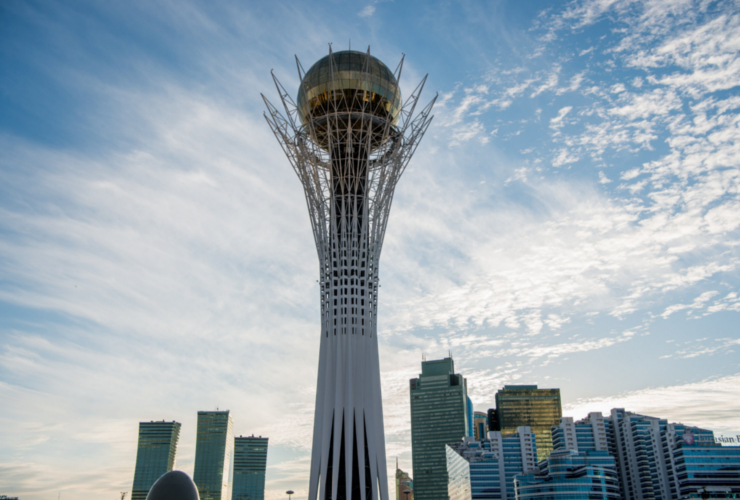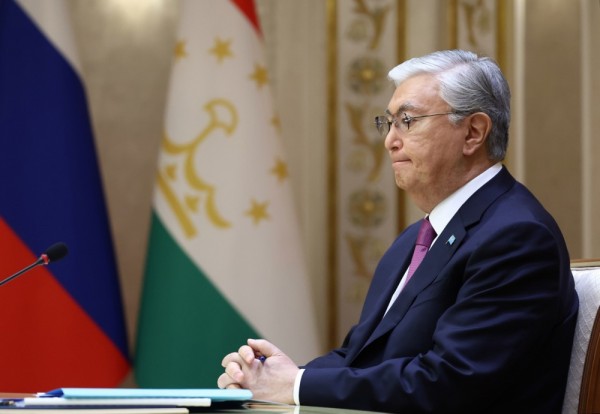The International Press Institute (IPI) today condemned a criminal investigation against the Kazakh investigative news site Ratel.kz and the magazine Forbes Kazakhstan for allegedly spreading “false information”. In addition, IPI urged Kazakhstan to stop the blocking of Ratel.kz and its social media channels.
On April 2, 2018, police raided the offices of Forbes Kazakhstan and Ratel.kz, confiscating computers, documents and even bank cards of certain journalists. On the same day, Ratel.kz Editor-in-Chief Marat Asipov, Deputy Editor Sapa Mekebayev and columnist Anna Kalashnikova, along with Forbes Kazakhstan Deputy Editor Alexander Vorotilov, were arrested and questioned for several hours before being released. In addition, the journalists’ homes were raided and searched. Vorotilov’s wife said in an interview with the Human Rights Watch that the police confiscated even her bank cards, leaving the family without money. The police also raided the apartment of Ratel.kz co-founder Gennady Benditsky, who died in December 2017.
The raids were conducted after former Kazakh Finance Minister Zeinulla Kakimzhanov filed a criminal complaint against the two publications, apparently over articles reporting on his alleged involvement in multiple corruption cases.
This is not the first time Kakimzhanov has waged a legal battle against these media outlets. In 2017, he won a civil defamation case against Forbes Kazakhstan and Ratel.kz, forcing the media outlets to pay him 50 million tenge, or around 128,000 euros, and delete the articles in question. Forbes Kazakhstan representative Gulmira Rakhimzhanova told IPI in an interview that even though Forbes Kazakhstan and Ratel.kz provided evidence to back up their reports on Kakimzhanov’s alleged corrupt activities, law enforcement authorities never investigated the claims.
While the current investigation is still ongoing, Rakhimzhanova said that the new charges are based on the same articles that were the subject of the previous civil case. She emphasized that the magazine had paid the damages imposed in that case, deleted the articles in question, and had not published anything related to the issue since.
“It is all about the same issue, but according to a different code. Last year it was the Civil Code, this time – the Criminal Code”, Rakhimzhanova said. “We would like to point out that all articles were deleted from forbes.kz according to the court’s decision on the civil claim.”
Kakimzhanov’s new case against these two media outlets has prompted criticism from human rights groups and the journalistic community. Kazakhstan-based media lawyer Gulmira Birzhanova said in an interview with IPI that the fact that Kakimzhanov has again turned to law enforcement bodies over the same matter shows how serious he is in his attempt to bring these media outlets down.
“This clearly indicates that they want to destroy this resource in Kazakhstan”, Birzhanova said, referring especially to Ratel.kz, which she described as essentially the only independent investigative news outlet in Kazakhstan.
All the journalists in this latest case are charged under Article 274 of Kazakhstan’s Criminal Code, which was added in 2015 and punishes the “dissemination of false information”. The maximum sentence is seven years in prison. According to legal experts, this article can be broadly interpreted, which poses a great threat to journalists and other media professionals who can be held liable for the dissemination of opinions.
“The very fact that (Kakimzhanov’s) statement was accepted and initiated under Article 274 of the Criminal Code of the Republic of Kazakhstan indicates that the situation is critical for the editors of the sites”, Birzhanova added.
Politically motivated blocking of investigative news site
In addition to the criminal investigation, Ratel.kz, which has been blocked several times in the past, was again blocked on March 19 following instructions from the Kazakh prosecutor general’s office. The blocking was based on the claim that the registration certificate of the domain was invalid since it was registered under the name of the deceased Ratel.kz co-founder Gennady Benditsky.
Ratel.kz then continued its work under two alternative domain names, Balborsyk.kz and Wildratel.com. On March 27, the domain name Ratel.kz was re-registered under Benditsky’s son’s name. On March 30, this domain was blocked by an Almaty district court following a complaint filed by the local prosecutor. All of the sites – Balborsyk.kz, Wildratel.com and Ratel.kz – have since been inaccessible.
“If they block Balborsyk.kz, it will be clear that this is a political issue, a matter of personal offence”, Ratel.kz Editor-in-Chief Asipov said on March 20 in an interview with Forbes Kazakhstan.
Birzhanova said that the continuous effort to block Ratel.kz in Kazakhstan indeed appeared to be a deliberate attempt to silence the media outlet.
“The very fact that the site was blocked and that the work of the entire editorial office is paralyzed in my opinion shows how excessive the measures have been that the state has taken in this case”, Birzhanova said.
Authorities have even blocked Ratel.kz’s Facebook page. In the interview with Forbes Kazakhstan, Asipov attributed the blockings to the site’s journalistic work.
“We can only guess who did not like our publications, because we had a large series of materials related to influential people and large companies of Kazakhstan”, he said.
According to Birzhanova, Ratel.kz is the only media outlet in Kazakhstan that does sufficiently “resonant and loud” investigative journalism, which makes its blocking even more serious. The field of investigative journalism is in trouble in Kazakhstan, Birzhanova said. Journalists are often afraid to carry out investigative work, not least because of the dire consequences such reporting might have.
“Unfortunately, we in Kazakhstan have problems with independent press and freedom of expression”, she explained. “If the website of Ratel is permanently closed, the situation will worsen even more.”
Call to end criminal defamation in Kazakhstan
IPI Deputy Director Scott Griffen urged Kazakhstan to drop all charges against Asipov, Mekebayev, Kalashnikova and Vorotilov and to unblock Ratel.kz, its additional domain names and social media channels.
“This case demonstrates the spectacular ease with which criminal defamation and similar laws can be abused to serve the interests of politicians and intimidate the media into silence”, he said. “Ratel.kz and Forbes Kazakhstan reportedly already faced civil judgment in this case, which would make this criminal investigation excessive and wholly unjustified.”
Despite years of advocacy by human rights activists, journalists and media experts, Kazakhstan retained criminal defamation and insult in its new 2015 Criminal Code. Lawmakers also introduced Article 274 on “disseminating false information” as an additional offence. A 2017 study conducted by IPI for the Organization for Security and Co-operation in Europe (OSCE) highlighted the use of these provisions against journalists. In Kazakhstan, media outlets usually lose the defamation cases brought against them and frequently face heavy fines, which can lead to bankruptcy.
“In addition to ending the criminal investigation against Ratel.kz and Forbes Kazakhstan, Kazakh authorities should urgently reform the country’s defamation laws in close cooperation with media and civil society groups”, he said. “Without such a reform – and in particular the repeal of all criminal defamation laws – Kazakh journalists will continue to be held hostage to the threat of disproportionate legal and financial repercussions for their work.”



